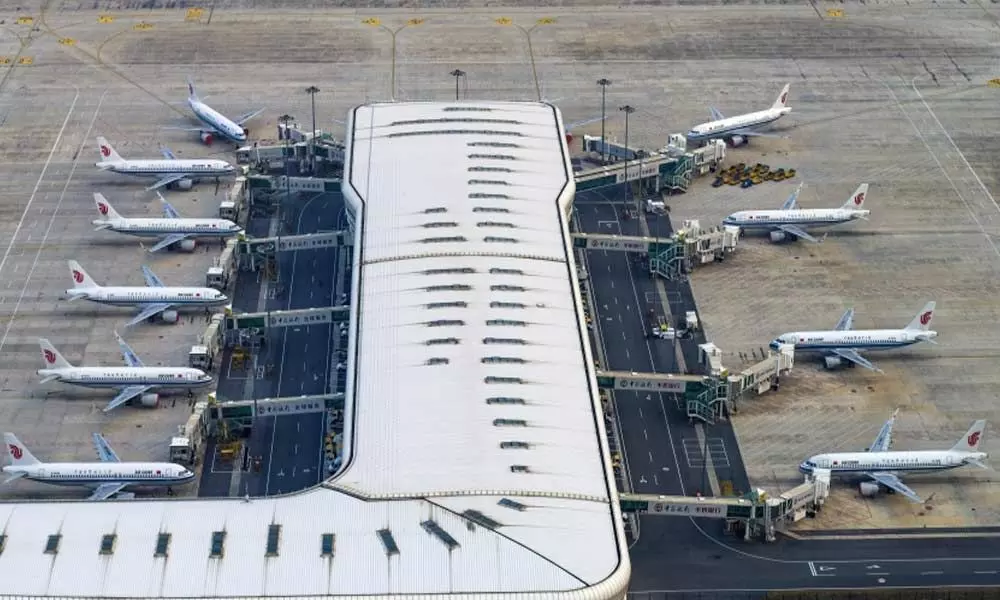Coronavirus outbreak in China injects fears for global supply chains

Taiwanese tech giant Foxconn said Wednesday it would keep its Chinese factories closed until mid-February and will allow local employees to delay their return after the new year break.
London: From carmaking to electronics and tourism, the outbreak of a new coronavirus in China is infecting companies around the world with anxiety about the impact on their supplies and earnings.
As authorities adopt drastic steps to contain the deadly virus, foreign businesses are braced for further disruption next month after the Lunar New Year holidays, which for now have shuttered most factories and offices in China.
Taiwanese tech giant Foxconn said Wednesday it would keep its Chinese factories closed until mid-February and will allow local employees to delay their return after the new year break.
The move could affect global supply chains for tech companies that rely on Foxconn to manufacture everything from Apple's iPhones to flat-screen TVs and laptops.
Chinese tour groups are banned from heading overseas meanwhile, promoting jitters among foreign luxury brands and high-end retail hubs such as Paris and Milan.
Airlines have slashed flights to China.
British Airways and Lufthansa have stopped flying there altogether.
Iris Pang, China economist at ING, forecast global tourism numbers could plummet by 30 percent this year from last due to the outbreak, which has spread out of China to the rest of Asia, Europe and North America.
In China itself, Pang said, year-on-year retail sales growth could halve to 3-4 percent, possibly imperilling the government's promises to import more US goods under a recent deal aimed at ending a protracted trade war.
"It is not necessarily the virus per se that is the problem for the world's economy," commented Jeffrey Halley, senior market analyst for Asia at OANDA in Singapore, after days of selloffs on stock markets in Asia, Europe and the United States.
"It is the self-feeding negative feedback loop on economic activity, and thus growth, it creates," he said, warning that a months-long crisis could even force the Federal Reserve to shift tack on US interest rates.
The extended holiday in China means the immediate impact on industrial production is limited for now.
Wuhan in Hubei province, the epicentre of the outbreak in central China, is a hub for US, European and Japanese carmakers, and electronics suppliers.
But now foreign countries are organising evacuation flights for their nationals out of the city.
And with China imposing quarantines on millions of people in several cities beyond Wuhan itself, while prolonging the break for a week beyond its scheduled finish on January 30, ripple effects for companies are inevitable.
Apple itself on Tuesday gave an unusually wide revenue forecast for this quarter, due to uncertainty about how the outbreak will affect its business.
Chief executive Tim Cook said Apple was working on "mitigation plans" to make up for any production loss from its suppliers in China, such as Foxconn, which accounts for the most US-bound exports by volume from Hubei province.
Another emblematic US brand, Starbucks, declined to offer further earnings guidance after posting its quarterly results, citing "the dynamic situation unfolding with the coronavirus".
Mainland China is Starbucks' second-biggest market, with more than 4,000 outlets, and half of them have been closed by the outbreak.
After Starbucks, the fast-food chains McDonald's and Domino's are most exposed among US brands as a percentage of their global revenues, according to Guggenheim analyst Matthew DiFrisco.
Prolonged disruption will affect an array of other sectors.
China is the leading producer of active pharmaceutical ingredients, which are repackaged by Western drugs companies into many life-saving treatments.
In the immediate firing line around Wuhan are General Motors, PSA, Renault, Nissan and Honda, who have all adopted the city as a base for joint carmaking ventures.
Each says it is monitoring the situation closely, while Toyota is suspending production in China until at least February 9 given the likely disruption not just for its own staff but to parts suppliers around the country.
Another automaker tracking the situation is entrepreneur Elon Musk's electric car firm Tesla, which has only just started to roll out Model 3 sedans from a new "giga-factory" in Shanghai, its first plant outside the United States.
"Investors are already showing signs of nervousness over this health crisis and its broader economic impacts, which will potentially be felt well beyond China, which is a vital source of global automotive industry profitability," according to David Leggett, automotive editor at GlobalData.








